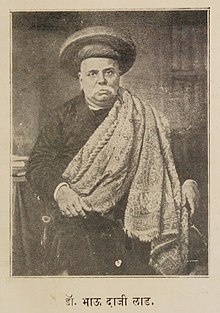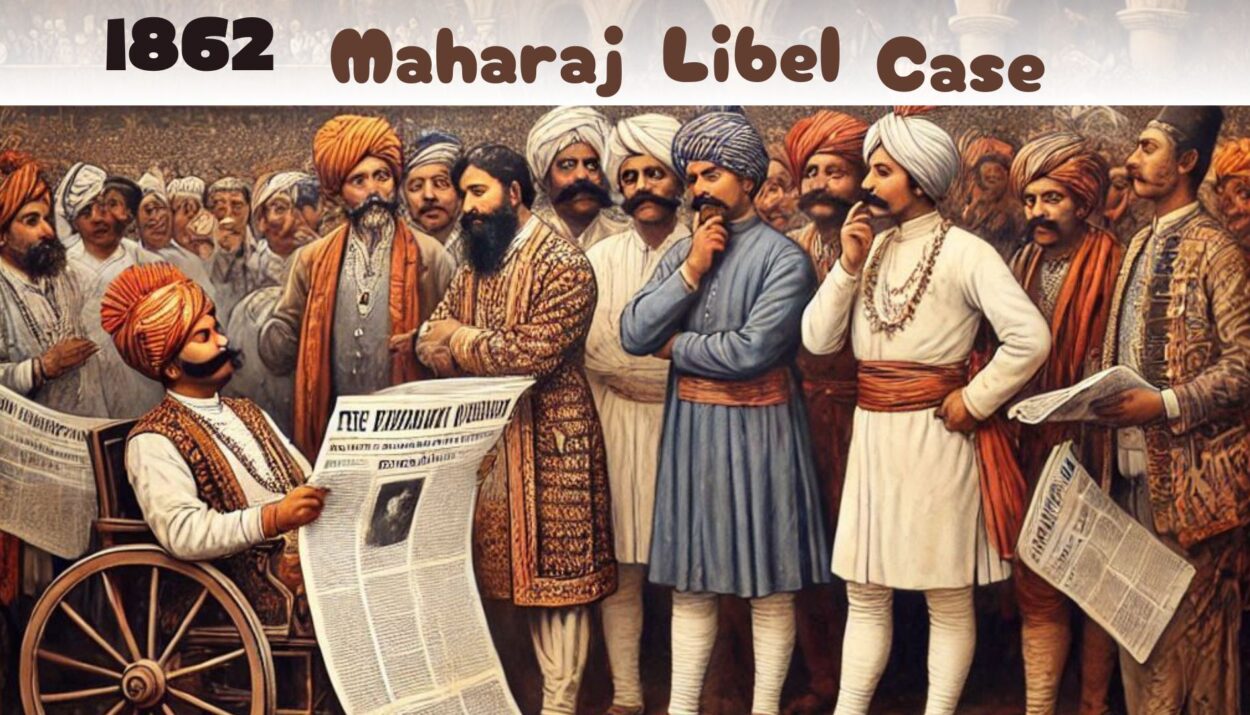An important chapter in colonial India’s legal and socioreligious history is the Maharaj Libel Case of 1862. The Maharaj Libel Case of 1862: A Landmark in Colonial Legal and Social History highlights the complexities of defamation laws and societal norms in British India, shedding light on the interplay between colonial authority and Indigenous cultural practices. This case revolved around accusations of sexual misconduct in the name of the ‘Charan seva’ by a prominent Hindu religious leader, Jadunathji Brijratanji Maharaj, a member of the influential Pushtimarg sect. This case raised important issues regarding religious authority, press freedom, and social morality during British rule.
Background to the Case
The case emerged against the backdrop of mid-19th century Bombay (now Mumbai), a city undergoing significant socio-political transformation under British colonial influence. The introduction of modern education, the proliferation of the printing press, and the rise of a critical intelligentsia heralded an era of reform and introspection. At the same time, traditional religious rituals came under increasing criticism, especially from reformist groups like the Prarthana Samaj and the Brahmo Samaj. These groups frequently drew attention to what they saw as the moral and ethical failings of the established religious systems.
Jadunathji Brijratanji Maharaj, the head of a subsect within the Pushtimarg (also known as the Vallabha Sampradaya), wielded immense influence over his followers. Pushtimarg, a Vaishnavite sect emphasizing devotion (bhakti) to Lord Krishna, had a hierarchical structure in which the Maharajs were revered as spiritual guides with quasi-divine authority.
By the mid-19th century, there were approximately 60–70 Maharajs across India, with 10 based in Bombay. Together, they commanded a following of 40,000–50,000 devotees. Notably, only two or three Maharajs were well-versed in Sanskrit, the sacred language of Hindu scriptures. The rest were accused of leveraging their inherited positions for personal gain, living in luxury, and allegedly ignorant of the spiritual responsibilities their roles demanded. These circumstances set the stage for a dramatic clash between tradition and reform, culminating in the Maharaj Libel Case.
Events Leading to the Trial
In 1860, Karsandas Mulji, a reformist journalist and editor of the Gujarati newspaper Satya Prakash, published a series of articles alleging moral corruption among certain Maharajs, including accusations of sexual exploitation of female devotees. Mulji criticized the blind veneration accorded to these religious leaders, which, he argued, enabled abuses of power and exploitation under the guise of spiritual guidance.
One specific article accused Jadunathji Maharaj of inappropriate behaviour, triggering outrage among his followers. They perceived the article as an attack on their faith and their leader’s sanctity. In response, Jadunathji Brijratanji Maharaj filed a defamation suit in 1861 against Karsandas Mulji and the newspaper’s publisher, Nanabhai Rustomji Ranina, in the Supreme Court of Bombay, alleging that the accusations were unfounded and injurious to his reputation.
When the trial commenced in 1862, it became a sensational public spectacle. The case attracted widespread attention, not only for its high-profile nature but also for the broader issues it raised regarding press freedom, the limits of religious authority, and the evolving cultural discourse on morality under colonial rule.
The Plaintiffs’ Case
The plaintiffs contended that Karsandas Mulji’s publications were defamatory and maliciously intended to tarnish the reputation of a respected religious leader. They argued that the articles were baseless, lacked substantive evidence, and inflicted severe damage on the personal reputation of Jadunathji Maharaj. Furthermore, they claimed the writings hurt the sentiments of the Pushtimarg community and disrupted social harmony by disrespecting deeply held religious beliefs. The legal team emphasized that such allegations undermined the sanctity of faith and the stability of societal order.
The Defence
Karsandas Mulji’s defence revolved around the argument that his writings served the public interest by exposing corruption within religious institutions. His counsel asserted that the press bore a responsibility to critique social evils and bring such issues to light. They maintained that the allegations against Jadunathji Maharaj were not only credible but also indicative of larger systemic problems. To support their case, the defence presented witnesses and testimonies that corroborated claims of misconduct and exploitation by some Maharajs, reinforcing the need for accountability.

Key Issues at Stake
Freedom of the Press: The case underscored the tension between the colonial state’s commitment to maintaining public order and the press’s emerging role as a societal watchdog. Mulji’s defence invoked the critical importance of journalistic freedom in exposing malpractices, even when it involved religious authorities.
Religious Sensibilities: The plaintiffs presented the case as a breach of religious sanctity and an assault on their faith. This highlighted the fine line that must be drawn between holding politicians responsible and honouring religious sensitivities.
Colonial Legal Framework: The case was adjudicated within a colonial judiciary often tasked with navigating the intersection of British legal principles and Indian socio-religious traditions. The court’s dual approach to issues like evidence, intent, and harm reflected the complexities of applying colonial law in a culturally pluralistic setting.
The Verdict
The court’s decision, delivered in 1862, was a landmark moment in colonial legal history. Chief Justice Sir Matthew Richard Sausse and Justice Joseph Arnould ruled in favour of Karsandas Mulji, concluding that his writings were not defamatory but a legitimate exercise in public interest journalism. The judgment emphasized the principle of accountability for individuals in positions of power, irrespective of their religious or social status. Although the court ordered Jadunathji Maharaj to pay Rs. 11,500 to Mulji as compensation, both parties incurred significant expenses due to the prolonged litigation.
Aftermath and Legacy
The Maharaj Libel Case had profound and far-reaching consequences for Indian society and its evolving relationship with colonial governance. For reformists like Karsandas Mulji, the verdict was a powerful validation of their efforts to challenge entrenched power structures and advocate for social accountability. It fostered greater scrutiny of religious institutions and practices, paving the way for broader reform movements. Additionally, it affirmed the vital role of the press in exposing social and institutional malpractices, establishing a precedent for journalistic independence.
For the Pushtimarg sect, the case represented a moment of crisis, revealing vulnerabilities in its leadership and public perception. While the immediate reaction saw the community rallying to support its leaders, the trial also triggered internal debates about the need for reform and greater transparency. It set a significant precedent by defining the limits of religious immunity in matters of public interest.
From a legal perspective, the case underscored the judiciary’s potential to act as a catalyst for social change. In colonial India, the ruling contributed to the emergence of a more robust public sphere by upholding principles of accountability and freedom of expression. The judgment demonstrated the court’s willingness to address issues of abuse and corruption within religious institutions, even at the risk of antagonizing powerful groups. It serves as a testament to the enduring impact of courageous advocacy and the power of reformist journalism.
Broader Implications
The Maharaj Libel Case of 1862 resonated deeply with broader debates surrounding modernity, tradition, and colonialism. It highlighted the challenges of reconciling long-standing cultural practices with emerging notions of individual rights and social justice. The case became a touchstone for subsequent legal and societal conflicts involving freedom of speech, gender justice, and the accountability of religious authorities.
The trial also underscored the complexities of colonial governance. Despite the British administration’s attempts to present itself as a neutral arbiter of justice, cases like this revealed the intricate entanglement of law, politics, and religion in a colonized society. While the verdict was progressive within its immediate context—endorsing press freedom and public accountability—it also aligned with the colonial state’s broader strategy of weakening indigenous power structures by exposing internal divisions.
Read- Devadasi System in India
Cultural Representations and Modern Impact
Saurabh Shah’s Novel and its Recognition
Saurabh Shah, a renowned Gujarati author and journalist, brought the Maharaj Libel Case to life in his novel Maharaj. The book intricately captured the nuances of the trial while delving into its broader societal and religious ramifications. Shah’s work earned critical acclaim and was honoured with the Nandshankar Award by the Narmad Sahitya Sabha, highlighting its literary and cultural significance.
Netflix’s Film Adaptation
In 2024, Netflix released the period drama film Maharaj, directed by Siddharth P. Malhotra and produced by Aditya Chopra under YRF Entertainment. The film marked the acting debut of Junaid Khan, son of Aamir Khan, alongside the acclaimed Jaideep Ahlawat. Drawing inspiration from both the historical case and Shah’s novel, the movie revisited the events and themes that shaped one of India’s most iconic legal battles.

The film’s release, however, was not without controversy. A Hindu group filed a petition in the Gujarat High Court, arguing that the movie could provoke violence against followers of the Pushtimarga Sampradaya. In response, the court issued a temporary stay, sparking a nationwide debate about freedom of expression and its tension with religious sentiments. Despite these hurdles, Maharaj premiered on June 21, 2024, as a Netflix exclusive. The film garnered significant viewership, reigniting interest in the landmark case and its enduring relevance.
Conclusion
The Maharaj Libel Case of 1862 remains a landmark in the records of Indian legal and social history. By addressing issues of religious authority, press freedom, and societal ethics, it provided a template for navigating the complexities of a pluralistic society under colonial rule. The case not only vindicated the role of reformist voices like Karsandas Mulji but also initiated a critical dialogue on the responsibilities of religious and social leaders. In doing so, it laid the foundation for a more accountable and transparent public sphere, the impact of which continues to be felt in contemporary debates on freedom, faith, and reform.
Read more-
- The Maharaj Libel Case of 1862: A Landmark in Colonial Legal and Social History
- Acclimatization: The Subtle Dance Between Humans and Their Environment
- The Anthropology of Sleep
- Lamarck’s Theory of Evolution
- Bipedalism and Structural Changes
References-






